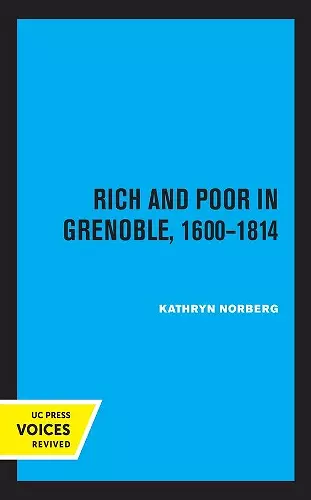Rich and Poor in Grenoble 1600 - 1814
Format:Hardback
Publisher:University of California Press
Published:11th May '23
Currently unavailable, our supplier has not provided us a restock date

Rich and Poor in Grenoble, 1600–1814 reframes early modern French poor relief as an analytical lens on social structure, culture, and economic change. Rejecting siloed treatments of institutions, attitudes, or “the poor” as separate objects of study, Kathryn Norberg reconstructs the shifting relationship between elites and the indigent at their point of closest contact. Set within a single city of average size and typical trajectories, the book contests the homogenizing “Old Regime” frame by tracing long-run transformations across confessional revival, Enlightenment, and Revolution. Post-Tridentine Catholicism, confraternal activism, and the punitive humanitarianism of the seventeenth century (“seigneurial” charity) give way to eighteenth-century institutional retrenchment and new sensibilities toward poverty—culminating in a politically driven renaissance of relief after 1789. Throughout, Norberg integrates institutional history (hospitals, workhouses, dépôts de mendicité), elite discourse, and popular culture to show how religious imaginaries, economic dislocation, crime, illegitimacy, and mobility interacted to reshape the moral economy of assistance.
Methodologically, the study is notable for its mixed archival and quantitative design. Norberg mobilizes an unusually rich evidentiary base—criminal court dossiers, bread-distribution rolls, registers of beggars and inmates—and, crucially, some 5,000 last wills and testaments. By pairing qualitative readings with statistical tools (including multiple regression and tobit analysis) and converting monetary values to constant livres, she tracks rates and meanings of charitable giving, distinguishes bequests to the poor from gifts to the Church, and gauges the reach of Counter-Reformation devotion and the impact of Enlightenment critiques. Key findings include a late-seventeenth-century surge in almsgiving absent any decline in poverty or crime; an eighteenth-century rise in illegitimacy amid falling violence; and an Enlightenment “modernization” of relief that narrowed rather than expanded aid. For historians of France, social welfare, religion, and the history of quantification, this is a model city study that restores poor relief to the center of debates on culture, inequality, and state formation.
This title is part of UC Press's Voices Revived program, which commemorates University of California Press’s mission to seek out and cultivate the brightest minds and give them voice, reach, and impact. Drawing on a backlist dating to 1893, Voices Revived makes high-quality, peer-reviewed scholarship accessible once again using print-on-demand technology. This title was originally published in 1985.
ISBN: 9780520360426
Dimensions: 229mm x 152mm x 25mm
Weight: 680g
384 pages